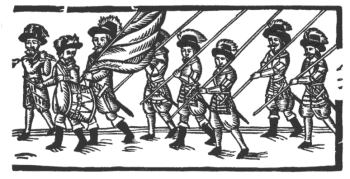Battel of Worcester
To the tune of; Green Sleeves or, Which Nobody Can Deny
 All you that be true to the King & the State,
All you that be true to the King & the State,
Come listen, and Ile tell you what happen'd of late,
In a large field near Worcesters gate,
Which no body can deny.
Brave Sir John Byron, true to the Crown,
VVith forces too few 'tis very well known,
VVent thither 'tis said, to keep the Town,
Which no body can deny.
But whether 'twas true, ye have learn'd to guess,
As for my own part I think no lesse,
To give you a taste of our Future successe,
Which no body can deny.
Thither came Fines with armes Complete,
The Town to take, and Byron defeat,
Provisions were made, but he staid not to eat,
Which no body can deny.
But as soon as he heard our great Guns play,
VVith a flea in's ear, he ran quite away,
Like the lawfull begotten Son of Lord Say,
Which no body, &c.
Nay had the old Crop-ear'd his Father dar'd
To approach the walls, his design had bin marr'd,
For Byron would not have proved a VVard,
Which no body, &c.
Pox on him he keeps his Patent yet,
But I hope next Term he shall not sit,
'Twas but quam diuse bene Gefferit,
Which no body, &c.
But now behold, increased in force,
Hee comes again with ten Troups of Horse,
Oh bloudy-Man he had no remorse,
Which nobody, &c.
They marched up boldly, without any fear,
Little thinking Prince Rupert was come so near,
But alas poor souls it cost them dear,
Which no body, &c.
The Prince like a Gallant man of his trade,
Marcht out of the Town till this quarter was made,
Sir, the Enemies are near at hand it is said:
Which no body, &c.
Where, where are they? Prince Rupert cryes,
And looking about with fiery eyes,
Some thirty behind a hedge he spyes,
Which no body, &c.
This Forlorn-hope he no sooner saw,
But 4. or 5. more did towards him draw;
He asked, who's there? one answer'd him, haw,
Which nobody, &c.
The man you'll say was rudely bred;
The Prince shot a Bullet into his head,
His haw had been better spared then said,
Which nobody, &c.
Prince Maurice then, to second his Brother,
Discharg'd his Pistol and down fell another,
'Twere pitty but news were sent to his Mother,
Which nobody, &c.
Lord Digby slew one to his great fame,
So did Monsieur de Lisle and Sir Rich. Crane,
And another French man, with a harder name,
Which nobody, &c.
Prince Rupert to his own Force retired,
And bad them not shoot till their Doublets were fired,
His Courage and Conduct were both admired,
Which no body, &c.
He Charged but twice, yet made them shrink,
Twere hard to get off now one would think,
Yet both can do it as easie as drink,
Which no body, &c.
Then amongst ye, quoth Sir Lewes Dives,
For a good Cause you know alwayes thrives,
His heart in his shoulders cost many mens lives,
Which no body, &c.
John Byron did as bravely fight;
To the Prince of Wales his great delight,
He came home safely and was made a Knight,
Which no body, &c.
My Friend David Walter in Doublet white,
Without any Armes either rusty or bright,
Charg'd through them twice like a little spright,
Which no body, &c.
But oh Prince Maurice, where was he?
Where one of us would loath to be,
Surrounded with Butchers three times three,
Which no body, &c.
These men of East-cheap little said,
But all their blows at his head they made,
As if they had been at work at their Trade,
Which no body, &c.
Then came a French-man fiery and keen,
And he broke the Ring and he came in between,
Ere a man let a fart not a Butcher was seen,
Which no body, &c.
Brave Lord Wilmot, by whose hands did fall
Many a Rebell stout and tall,
Came to him without any Armes at all,
Which no body, &c.
Their Horses then close up they spur'd,
The wounds they gave were all with the Sword,
Their Pistols proved not worth a turd,
Which no body, &c.
But the Parliament having quite forgot
To Vote that Sandys should not be shot
By the hand of a Mounsier he went to the pot.
Which no body, &c.
Douglas a Scotch-man of great fame
Was slain that day for want of the same;
The Houses in this were much to blame,
Which no body, &c.
Of all their chief Commanders that day,
I hold it fit I should something say,
His name was Brown, and he ran away,
Which no body, &c.
If a few more o'em should shew such a streak,
Both Houses surely would quickly break,
And honester men would have leave to speak,
Which no body, &c.
They fly, they fly, Prince Rupert cry'd,
No sooner said, but away they hy'd;
The force of his Armes they durst not abide,
Which no body, &c.
|
|

 Return
to the Blackletter Ballad Page.
Return
to the Blackletter Ballad Page.